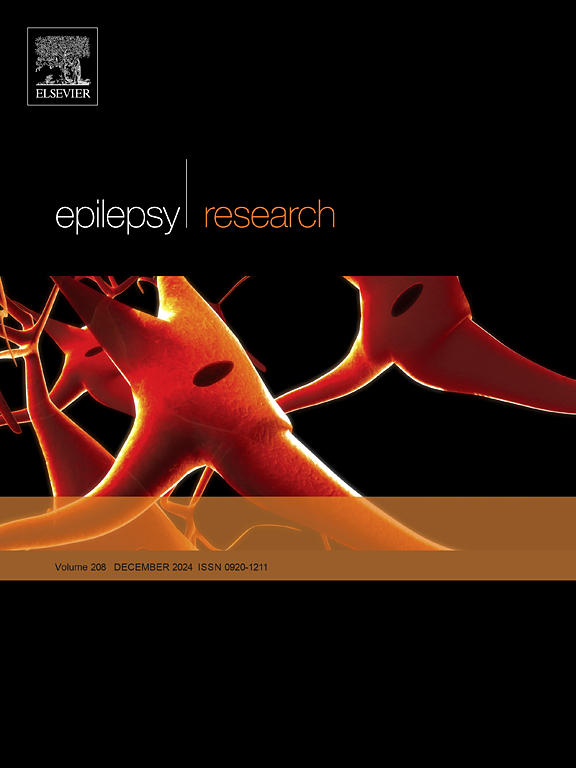The relationship between disease self-management and internalized stigmatization in individuals with epilepsy: A sample in eastern Turkey
IF 2
4区 医学
Q3 CLINICAL NEUROLOGY
引用次数: 0
Abstract
Background
Epilepsy is often misunderstood, leading to fear, stigmatization of patients and the risk of social discrimination. For some patients, social stigma can be an even bigger problem than epilepsy itself.
Aim
This study examined the relationship between self-management and internalized stigma levels in individuals diagnosed with epilepsy.
Methods
This descriptive and cross-sectional study was conducted in the Neurology Outpatient Clinic of a Training and Research Hospital and 128 epilepsy patients were included in the sample based on various inclusion criteria such as having a diagnosis of epilepsy for at least six months, being over the age of 18, not having any psychiatric disorder that would prevent reading and comprehension.The Sociodemographic Data Form, Internalized Stigma in Epilepsy Scale, and Epilepsy Self-Management Scale were used to collect the data.
Results
The mean age at disease onset was 19.5 ± 11.7 years. In terms of the demographics of the patients, 55.5 % were female, 46 % were aged 18–22 years, 53.9 % were single, 30 % were at least university graduates, 85.2 % had income equal to their expenses, 75.8 % had a seizure frequency of more than one per year, 58.6 % had generalized onset seizures, and 73.4 % used one drug. The patients’ Self-Management Scale total score was 111.01 ± 13.22, and their Internalized Stigma Scale total score was 49.9 ± 12.9. The correlation analysis indicated a high significant negative correlation between the Self-Management Scale total score and the Internalized Stigma Scale total score (p < 0.001).
Conclusions
The patients’ self-management levels were above average, and their internalized stigma levels were moderate. The patients were most stigmatized in the areas of isolation and discrimination. Generally, as the self-management skills of patients increased, their internalized stigma levels decreased. In this context, it is recommended that intervention studies be conducted to increase the self-management levels and reduce stigma for individuals diagnosed with epilepsy.
癫痫患者疾病自我管理与内化污名化之间的关系:土耳其东部的一个样本
癫痫常常被误解,导致恐惧、对患者的污名化和社会歧视的风险。对一些患者来说,社会污名可能是比癫痫本身更大的问题。目的探讨癫痫患者自我管理与内化病耻感水平的关系。方法本研究在某培训研究型医院神经内科门诊进行,选取了128例癫痫患者作为样本,纳入标准包括癫痫诊断至少6个月,年龄在18岁以上,无任何妨碍阅读和理解的精神障碍。采用《社会人口学数据表》、《癫痫内化污名量表》和《癫痫自我管理量表》进行数据收集。结果平均发病年龄为19.5 ± 11.7岁。在患者的人口统计学方面,55.5% %为女性,46 %为18-22岁,53.9% %为单身,30 %至少为大学毕业生,85.2% %的收入与支出相当,75.8% %的癫痫发作频率每年超过一次,58.6% %为全发性癫痫发作,73.4 %使用一种药物。患者自我管理量表总分为111.01 ± 13.22,内化耻感量表总分为49.9 ± 12.9。相关分析显示,自我管理量表总分与内化耻感量表总分呈高度显著负相关(p <; 0.001)。结论患者自我管理水平处于中等偏上水平,内化耻感水平处于中等水平。患者在隔离和歧视方面最受侮辱。一般来说,随着患者自我管理技能的提高,他们的内化污名水平降低。在这种情况下,建议开展干预研究,以提高自我管理水平,减少癫痫患者的耻辱感。
本文章由计算机程序翻译,如有差异,请以英文原文为准。
求助全文
约1分钟内获得全文
求助全文
来源期刊

Epilepsy Research
医学-临床神经学
CiteScore
0.10
自引率
4.50%
发文量
143
审稿时长
62 days
期刊介绍:
Epilepsy Research provides for publication of high quality articles in both basic and clinical epilepsy research, with a special emphasis on translational research that ultimately relates to epilepsy as a human condition. The journal is intended to provide a forum for reporting the best and most rigorous epilepsy research from all disciplines ranging from biophysics and molecular biology to epidemiological and psychosocial research. As such the journal will publish original papers relevant to epilepsy from any scientific discipline and also studies of a multidisciplinary nature. Clinical and experimental research papers adopting fresh conceptual approaches to the study of epilepsy and its treatment are encouraged. The overriding criteria for publication are novelty, significant clinical or experimental relevance, and interest to a multidisciplinary audience in the broad arena of epilepsy. Review articles focused on any topic of epilepsy research will also be considered, but only if they present an exceptionally clear synthesis of current knowledge and future directions of a research area, based on a critical assessment of the available data or on hypotheses that are likely to stimulate more critical thinking and further advances in an area of epilepsy research.
 求助内容:
求助内容: 应助结果提醒方式:
应助结果提醒方式:


